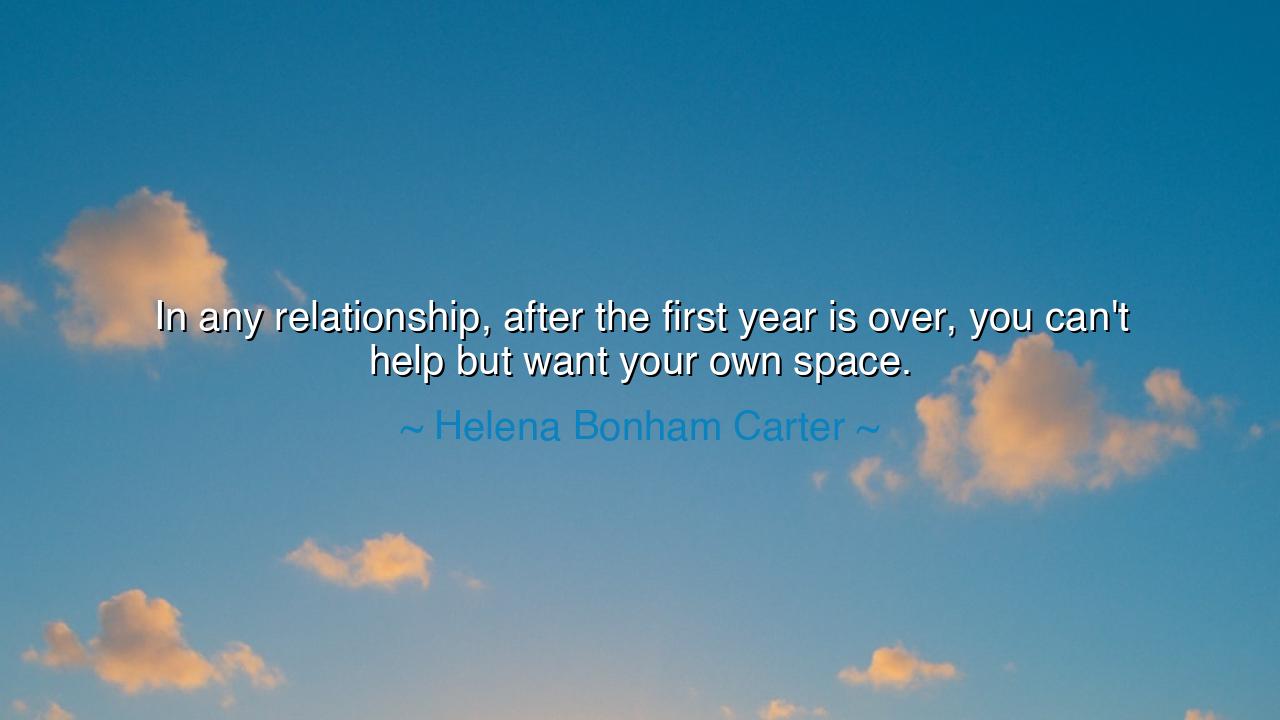
In any relationship, after the first year is over, you can't help
In any relationship, after the first year is over, you can't help but want your own space.






Hear the words of Helena Bonham Carter, spoken with the wisdom of one who has lived both love and life’s trials: “In any relationship, after the first year is over, you can’t help but want your own space.” This is no cynicism, nor rejection of love—it is the recognition of a deeper rhythm of the human soul. For love begins with fire, with the closeness of breath and touch, yet as time unfolds, the heart remembers that it is also a solitary temple, needing silence, needing freedom, needing space to remain whole.
The ancients too knew this truth. In the myths of Greece, even the union of mighty gods was not without distance. Hera and Zeus, though bound in marriage eternal, often parted in strife, only to return again when balance was restored. The lesson whispered in their tales is clear: intimacy without separation breeds suffocation, while love coupled with freedom allows passion to endure. To crave space is not to abandon the bond, but to protect it, to allow it to breathe like a flame that would otherwise choke without air.
Consider the tale of Frida Kahlo and Diego Rivera, two souls bound in both love and tempest. Their relationship was fierce, filled with creation and destruction alike, but each found renewal in returning to their own work, their own space, their own identity as artists. Without such separations, their passion may have consumed them utterly. It was in those interludes of independence that they could once again meet as equals, with fresh fire to fuel their shared life. So too does Helena’s saying echo this ancient and modern wisdom—that true unity is not chains, but a dance of closeness and release.
The first year of any bond often intoxicates. Lovers long for constant presence, for unbroken nearness, for the bliss of union. Yet as the seasons pass, a new yearning rises—the yearning to breathe one’s own breath again, to hear one’s own voice without another’s echo, to stand in solitude without shame. This is not betrayal of love, but its maturing. A tree planted too close to another cannot grow strong; its roots must have room, its branches must stretch into their own portion of the sky. Only then can the grove flourish.
Thus, the lesson of Helena’s words is not despair, but guidance: let every relationship honor both togetherness and separateness. Let lovers not fear the desire for space, but embrace it as the soil in which trust and respect grow. For in granting freedom, one gives the highest gift—confidence that the bond will endure even when apart. This balance is the mark of enduring companionship, where closeness is chosen, not compelled.
And what, then, should each of us do in our own lives? If you love, cherish the moments of union, but do not bind your beloved so tightly that they cannot breathe. Encourage them to seek their own pursuits, to guard their own spirit, to flourish in their individuality. And in turn, guard your own space with tenderness, for only a whole self can give fully to another. Let love be a circle of two whole beings, not a prison where both lose themselves.
Remember always: to desire one’s own space is not to withdraw love, but to strengthen it. Just as the moon does not forsake the earth when it wanders its orbit, but continues in harmony, so too can lovers orbit each other with respect and freedom, without severing the bond. The flame of love is not brightest when it consumes, but when it endures, steady and balanced, with room for both souls to breathe.






AAdministratorAdministrator
Welcome, honored guests. Please leave a comment, we will respond soon